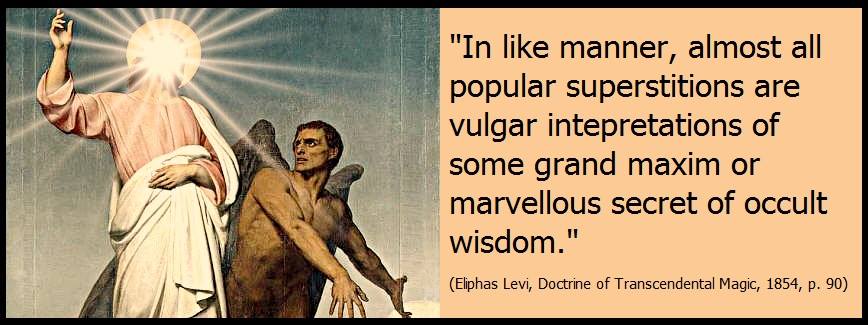indirectly upon our fortunes. And here we must permit ourselves a digression.
How the ancients regarded the heavenly bodies is very hard to determine, for one unacquainted with the esoteric explanation of their doctrines. While philology and comparative theology have begun the arduous work of analysis, they have as yet arrived at meagre results. The allegorical form of speech has often led our commentators so far astray, that they have confounded causes with effects, and vice versa. In the baffling phenomenon of force-correlation, even our greatest scientists would find it very hard to explain which of these forces is the cause, and which the effect, since each may be both by turns, and convertible. Thus, if we should inquire of the physicists, “Is it light which generates heat, or the latter which produces light?” we would in all probability be answered that it is certainly light which creates heat. Very well; but how? did the great Artificer first produce light, or did He first construct the sun, which is said to be the sole dispenser of light, and, consequently, heat? These questions may appear at first glance indicative of ignorance; but, perhaps, if we ponder them deeply, they will assume another appearance. In Genesis, the “Lord” first creates light, and three days and three nights are alleged to pass away before He creates the sun, the moon, and the stars. This gross blunder against exact science has created much merriment among materialists. And they certainly would be warranted in laughing, if their doctrine that our light and heat are
Page 270
derived from the sun were unassailable. Until recently, nothing has happened to upset this theory, which, for lack of a better one, according to the expression of a preacher, “reigns sovereign in the Empire of Hypothesis.” The ancient sun-worshippers regarded the Great Spirit as a nature-god, identical with nature, and the sun as the deity, “in whom the Lord of life dwells.” Gama is the sun, according to the Hindu theology, and “The sun is the source of the souls and of all life.” Agni, the “Divine Fire,” the deity of the Hindu, is the sun, for the fire and sun are the same. Ormazd is light, the Sun-God, or the Life-giver. In the Hindu philosophy, “The souls issue from the soul of the world, and return to it as sparks to the fire.” But, in another place, it is said that “The Sun is the soul of all things; all has proceeded out of it, and will return to it,” which shows that the sun is meant allegorically here, and refers to the central, invisible sun, GOD, whose first manifestation was Sephira, the emanation of En-Soph — Light, in short.
“And I looked, and behold, a whirlwind came out of the north, a great cloud, and a fire infolding itself, and a brightness was about it,” says Ezekiel (i., 4, 22, etc.), “. . . and the likeness of a throne . . . and as the appearance of a man above upon it . . . and I saw as it were the appearance of fire and it had brightness round about it.” And Daniel speaks of the “ancient of days,” the kabalistic En-Soph, whose throne was “the fiery flame, his wheels burning fire. . . . A fiery stream issued and came forth from before him.” Like the Pagan Saturn, who had his castle of flame in the seventh heaven, the
Jewish Jehovah had his “castle of fire over the seventh heavens.” If the limited space of the present work would permit we might easily show that none of the ancients, the sun-worshippers included, regarded our visible sun otherwise than as an emblem of their metaphysical invisible central sun-god. Moreover, they did not believe what our modern science teaches us, namely, that light and heat proceed from our sun, and that it is this planet which imparts all life to our visible nature. “His radiance is undecaying,” says the Rig-Veda, “the intensely-shining, all-pervading, unceasing, undecaying rays of Agni desist not, neither night nor day.” This evidently related to the spiritual, central sun, whose rays are all-pervading and unceasing, the eternal and boundless life-giver. HE the Point; the centre (which is everywhere) of the circle (which is nowhere), the ethereal, spiritual fire, the soul and spirit of the all-pervading, mysterious ether; the despair and puzzle of the materialist, who will some day find that that which causes the numberless cos-

Moe is the founder of GnosticWarrior.com. He is a father, husband, author, martial arts black belt, and an expert in Gnosticism, the occult, and esotericism.

![How one in the province of the Northumbrians, rose from the dead, and related many things which he had seen, some to be greatly dreaded and some to be desired [Circ. 696 A.D.] | Book 5 | Chapter 11 How one in the province of the Northumbrians, rose from the dead, and related many things which he had seen, some to be greatly dreaded and some to be desired [Circ. 696 A.D.] | Book 5 | Chapter 11](https://www.gnosticwarrior.com/wp-content/plugins/contextual-related-posts/default.png)




